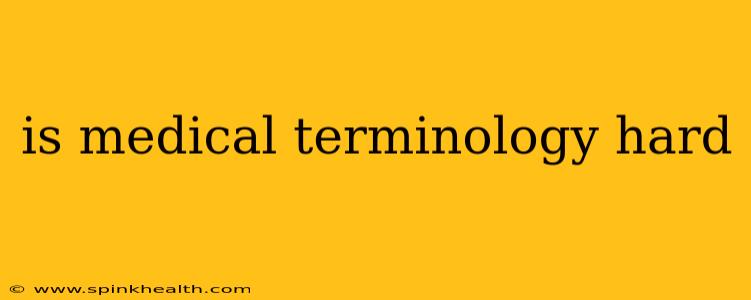Is Medical Terminology Hard? A Journey Through the Labyrinth of Medical Language
The question, "Is medical terminology hard?" is a common one, and the answer, like many things in medicine, is nuanced. It's not simply a "yes" or "no." My journey into the world of medical terminology started with a similar apprehension – a daunting wall of seemingly indecipherable words. But I soon discovered that while challenging, mastering medical terminology is achievable with the right approach and consistent effort.
Think of learning medical terminology as embarking on a fascinating adventure. Initially, you're navigating a labyrinth of unfamiliar words, each a cryptic clue leading you deeper into the world of human anatomy, physiology, and disease. You'll stumble, you'll feel lost, but with persistence, the path will become clearer.
What Makes Medical Terminology Seem Difficult?
Many find medical terminology challenging because it's built upon a foundation of Greek and Latin roots, prefixes, and suffixes. These building blocks combine to create complex words that, at first glance, seem impenetrable. The sheer volume of terms can also be overwhelming. But let's break down the perceived difficulty:
- Origin: The ancient roots make it different from everyday English, requiring a new way of thinking.
- Complexity: Words are often long and combine multiple elements, creating seemingly unbreakable terms.
- Specificity: Medical terms are incredibly precise, needing to clearly define a specific condition, procedure, or body part.
How Can I Make Learning Medical Terminology Easier?
The good news is that, despite the initial intimidation, mastering medical terminology is not an insurmountable task. Here are some strategies that I found helpful:
1. Understanding the Building Blocks: Instead of memorizing every single word individually, focus on learning the common prefixes, suffixes, and roots. Once you understand these fundamental elements, you can decipher the meaning of many new words. For example, knowing that "cardio" refers to the heart and "-itis" signifies inflammation allows you to easily understand "carditis" as inflammation of the heart.
2. Using Mnemonics and Flashcards: These tools are invaluable for memorizing terms. Creating your own mnemonics can be especially effective, as it actively engages your brain. Flashcards allow for spaced repetition, a powerful learning technique.
3. Contextual Learning: Learning medical terminology within a broader medical context is extremely helpful. Reading medical textbooks, articles, or watching educational videos can provide the context needed to understand the terms in their appropriate settings.
4. Practice, Practice, Practice: Consistent practice is key. The more you use the terminology, the more comfortable you'll become. Try incorporating medical terms into your daily conversations (where appropriate, of course!).
What are Some Common Medical Prefixes, Suffixes, and Roots?
This is where the real fun begins! Let's explore some fundamental elements:
- Prefixes: "a-" (without), "anti-" (against), "hyper-" (above, excessive), "hypo-" (below, deficient)
- Suffixes: "-itis" (inflammation), "-ectomy" (surgical removal), "-oma" (tumor), "-pathy" (disease)
- Roots: "cardi" (heart), "hepat" (liver), "derm" (skin), "neuro" (nerve)
Is there a quick way to learn medical terminology?
There's no magic bullet, but focused, strategic learning is far more effective than cramming. Concentrating on building a strong foundation of prefixes, suffixes, and roots will significantly speed up your learning process.
How long does it take to learn medical terminology?
The time it takes to become proficient varies greatly depending on your learning style, prior knowledge, and the depth of your learning goals. Some might grasp the basics quickly, while others may require more time. Consistent effort and effective study techniques are crucial.
In conclusion, while medical terminology presents a significant challenge initially, it's a conquerable one. By embracing a structured approach, focusing on the building blocks of the language, and utilizing effective learning strategies, anyone can successfully navigate this fascinating world of medical vocabulary. So, embrace the challenge, and enjoy the journey!

